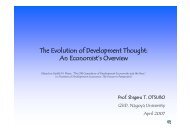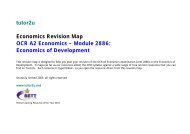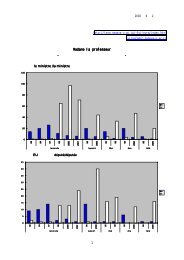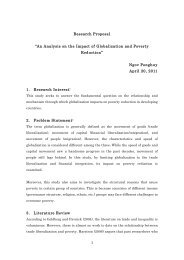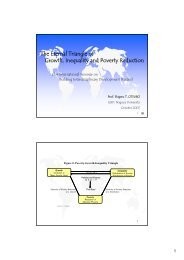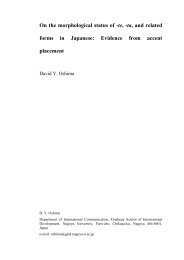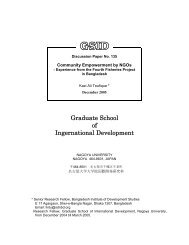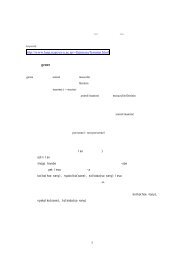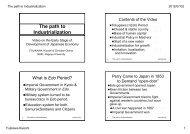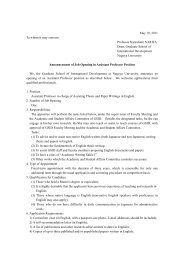Report
Report
Report
Create successful ePaper yourself
Turn your PDF publications into a flip-book with our unique Google optimized e-Paper software.
CONSTRUCTION AND RELATED ENGINEERING SERVICES 113<br />
a cautious approach with respect to import of<br />
construction and related engineering services.<br />
Although Bangladesh took very limited commitments<br />
in a few services such as tourism, financial and<br />
telecommunications services during the Uruguay Round<br />
and spillover negotiations, it ought to undertake<br />
commitments in many other services if it is to sustain a<br />
relatively high rate of economic growth. Bangladesh<br />
being an LDC seems to have taken the stand thus far<br />
that LDCs should not be asked to undertake commitments<br />
in the sectors it does not wish to. However, the<br />
study strongly argues that LDCs should stop insisting<br />
that they do not need to open any sectors. Many sectors<br />
would benefit through an open policy regime and a<br />
predictable competitive environment. Others also<br />
suggest that inadequate infrastructure in Bangladesh<br />
provides immense investment opportunity particularly<br />
in the construction industry (UNCTAD-ICC 2000).<br />
As technology transfer plays a significant role in<br />
the development of this sector and it has high stakes<br />
for domestic service providers, as well as substantial<br />
imports, Raihan and Mahmood suggest that<br />
liberalisation of this sector should be balanced. As of<br />
now there are no major restrictions in the sector. FDI<br />
is allowed and even labour movement is permitted<br />
though subject to existing laws. Bangladeshi construction<br />
workers go abroad to work on construction sites<br />
and it gains substantial amount of foreign exchange as<br />
workers remittances. Their foreign work experience<br />
would be an advantage while working in South Asia.<br />
But for that to happen Bangladesh needs to undertake<br />
commitments in the sector. Bangladesh should undertake<br />
wider and deeper commitments in the sector and<br />
in all modes. Although it may find it difficult to make<br />
such liberal commitments under the GATS regime, it<br />
must do so as part of SAFTA. By so doing in fact, Bangladesh<br />
would gain more by liberalising its services sector<br />
as it will have access to bigger markets in the region.<br />
Nepal<br />
Nepal is one of the few LDCs, which have recently<br />
acceded to the WTO. As part of its accession negotiations<br />
it was asked to undertake relatively liberal<br />
commitments in as many services sectors as it could.<br />
As a consequence, what we have today is undoubtedly<br />
one of the most liberal schedules of commitments in<br />
services undertaken by any South Asian country.<br />
In the construction and related services sector Nepal<br />
has undertaken commitments in two out of five subsectors<br />
– general construction work for civil engineering<br />
(CPC 513) and other (CPC 511+515+518). Unlike<br />
Pakistan which has proposed commitments in some<br />
segments of the only one subsector of the construction<br />
sector at four-digit level classification, these two<br />
subsectors as committed by Nepal are at three-digit<br />
level implying that its commitments fully cover the two<br />
subsectors. Further, Nepal has inscribed no restrictions<br />
of whatsoever nature in Modes 1 and 2 and Mode 3<br />
stipulates that the entry is subject to incorporation in<br />
Nepal with a maximum foreign equity capital of 51%<br />
though Mode 4 is unbound and refers to the horizontal<br />
section. Specifically for the subsector – general<br />
construction work for civil engineering (CPC 513) the<br />
commitment states that foreign equity participation<br />
will be increased to 80% after five years from the date<br />
of accession which will come into effect in April 2009.<br />
In the National Treatment column in both subsectors<br />
Modes 1, 2, and 3 are without any sectoral limitations<br />
and Mode 4 remains unbound referring to the horizontal<br />
section.<br />
As regards the horizontal commitments which<br />
apply to the construction sector, under Mode 4 entry<br />
of three kinds of natural persons is allowed – services<br />
sales persons, persons responsible for setting up a<br />
commercial presence and ICTs. Unlike India and<br />
Pakistan, Nepal has not made any provisions for<br />
professionals or independent professionals. Under the<br />
National Treatment column also there are some<br />
limitations. Under Mode 1 national treatment has not<br />
been accorded with respect to foreign exchange<br />
provided to foreigners (excluding those categories of<br />
persons covered by Nepal’s schedule) to pay for any<br />
cross-border services. Under Mode 3 a foreign investor<br />
reinvesting earnings is required to obtain the permission<br />
of the Department of Industry, all foreign investments<br />
except for financial services require approval by the<br />
Department of Industry, and incentives and subsidies<br />
are available only to enterprises wholly owned by<br />
Nepalese nationals. Under Mode 4 national treatment<br />
is accorded to only those categories of natural persons<br />
referred to in the market access column. Moreover, it<br />
has been made clear that the selling and buying real<br />
estate is the constitutional right of every Nepalese<br />
citizen. The civil code prohibits anyone from selling,<br />
mortgaging, gifting or endowing or disposing any real<br />
property to a foreign individual.<br />
Apart from the limitations inscribed under Market<br />
Access and National Treatment columns Nepal has also<br />
undertaken some additional commitments. The first<br />
commitment stipulates that an environmental impact<br />
is required and approval of an investment will not<br />
normally be withheld except for failure to meet




